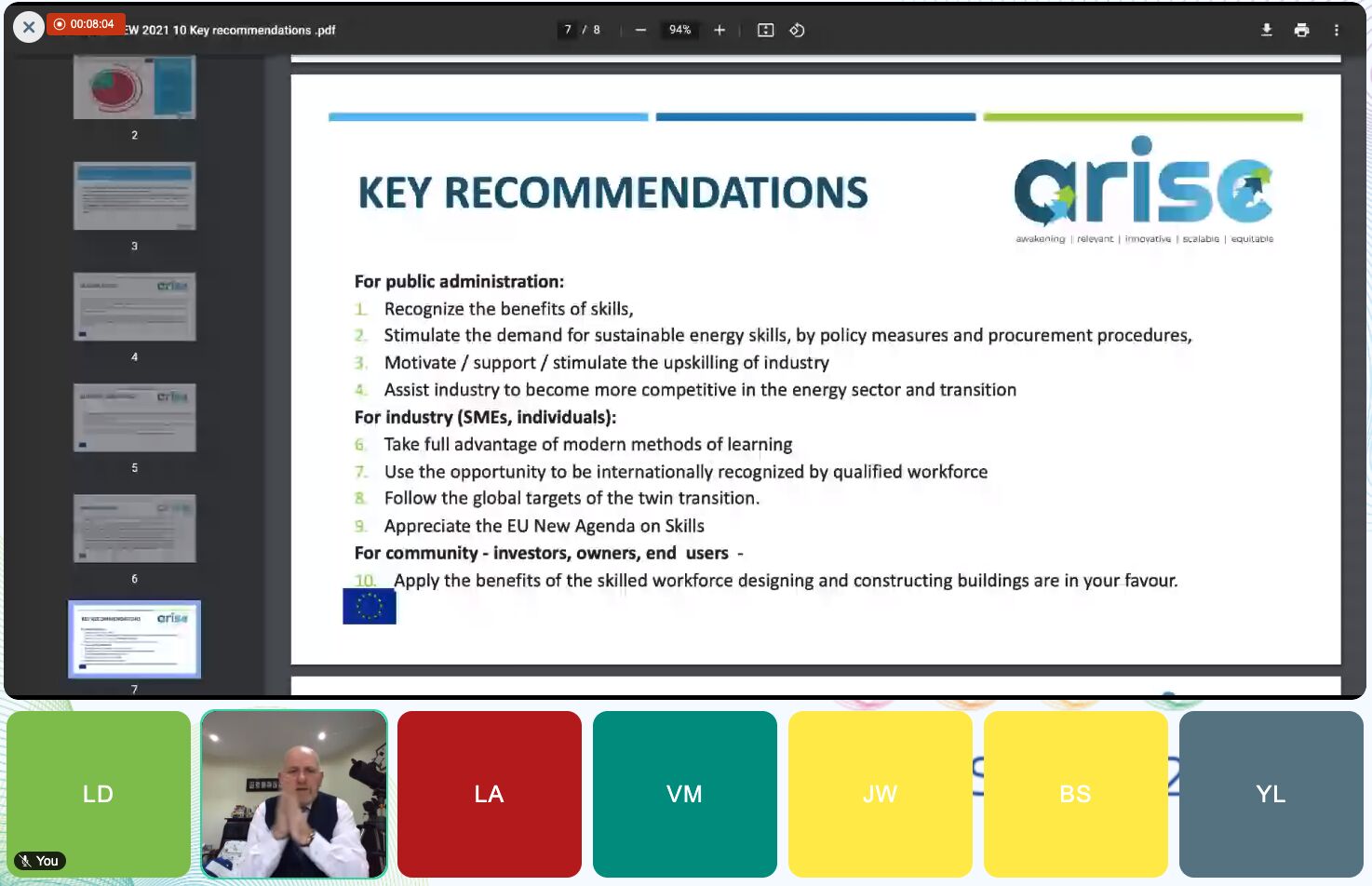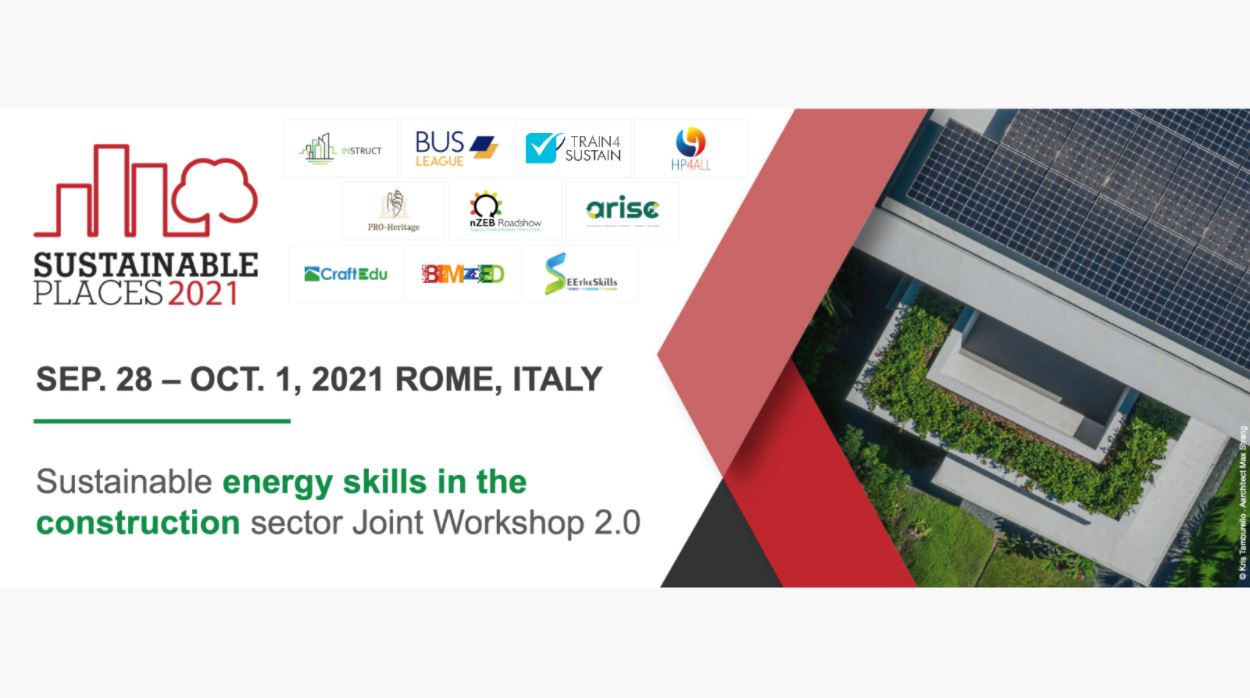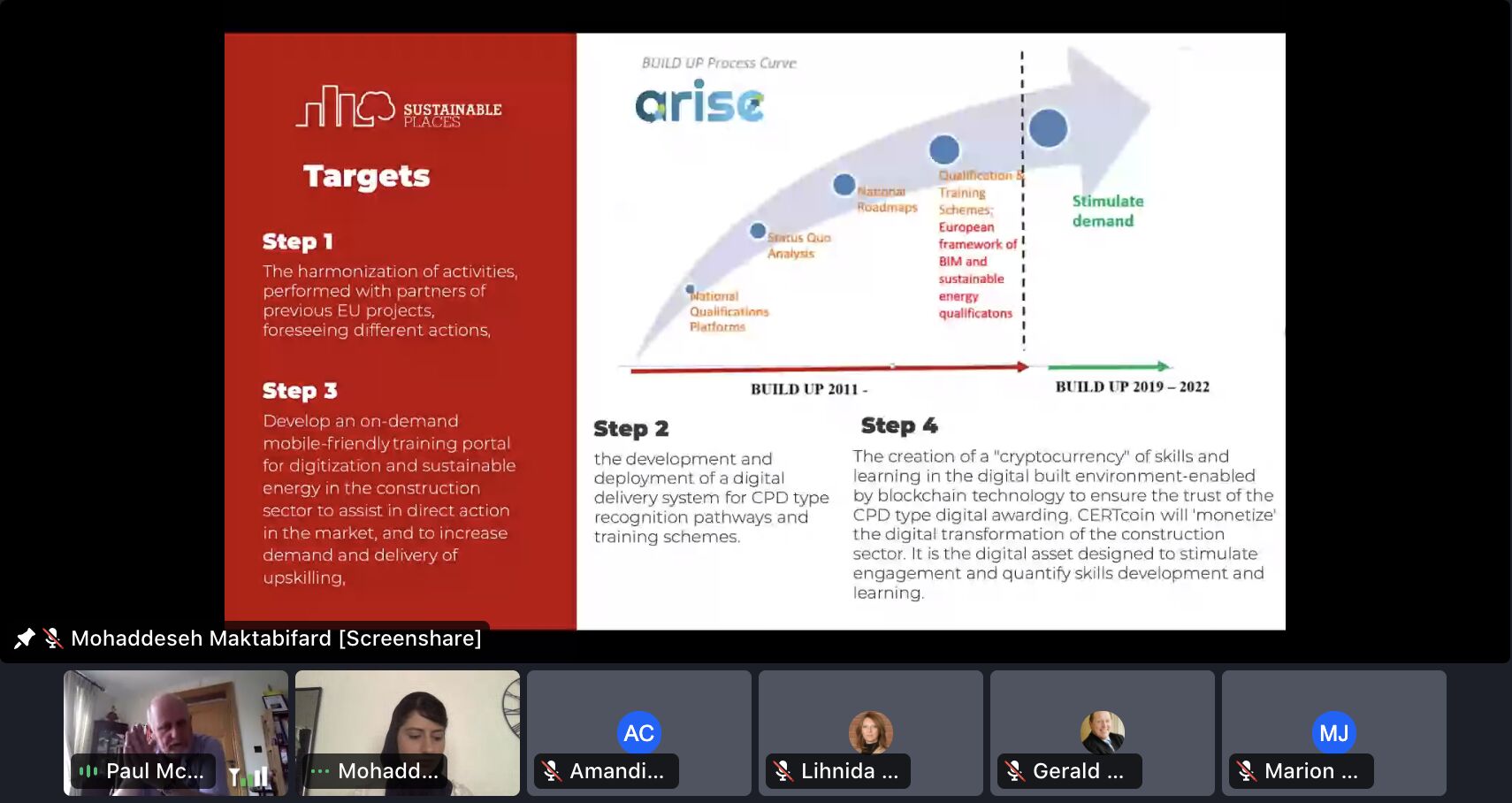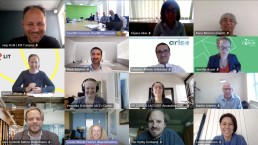EUSEW 2021: Energy Talks 25 - 29 Octobre 2021
The EU Sustainable Energy Week (EUSEW) took place on 25-29 October 2021 under the theme: ‘Towards 2030: Reshaping the European Energy System’.
This year, as last year EUSEW went digital. The event comprised a 3-day digital Policy Conference, the EUSEW Awards, the second European Youth Energy Day as well as 1:1 video meetings, virtual stands and other networking activities. Participants had access to online side events and Sustainable Energy Days, digital events that took place all over Europe.

ARISE project coordinator Paul McCormack presented in the section #energytalk '10 key policy recommendations on #digitalising the #construction sector for a clean #energy #transition'. He explained why the construction industry must empower their staff to enable them to design a digital transformation roadmap for the sector.
Sustainable energy skills in the construction sector joint workshop 2.0 at #SP2021

ARISE will develop an on-demand mobile-friendly training project portal forc and sustainable energy in the construction sector. The project will also create a "cryptocurrency" of development skills and learning in the digital built environment to stimulate engagement and quantify skills development and learning.
You will find the registration of the workshop at this link.

You Tube recording:
https://youtu.be/xlZseb0UzMQ
Digital Transformations - building services engineering article
Find the full article on the building services engineering website.
If industry is to develop and leverage its digital skills for energy efficient construction, and increase its competitiveness, it will be driven via the skills of the workforce. Upskilling must be demand-driven, demand both from the industry perspective and from the workers in the industry. It is this “meeting of demands” that will lead to success in meeting the needs of industry, society and the environment.
Digital transformation is a topical subject for all of industry and is seen as a key organisational strategy to support sustainable growth, especially in industries such as construction which is seen as a technology laggard. BIM is recognised as one of the main digital tools that are critical enablers that can embed digital processes within organisations. Specifically, the information management processes within BIM help companies in transforming traditional information processes and turning the information into data that is easier handled, used and analysed.
ARISE Launch
Belfast Metropolitan College launched their new £1.12 million European digital construction project, ‘ARISE’ in the 2 days KICK OFF meeting 1st and 2nd September 2021.
ARISE aims to revolutionise the learning process by changing the face of delivery and recognition of sustainable energy skills in the building sector.
ARISE’s mission is to support the twin transition of the design and construction sector and to contribute thereby to the European Recovery and Resilience Plans 2021 -2027, by providing the building sector professionals with digital and sustainable energy skills of the future, along with demand-side guidelines for marketable appreciation of skills and exploitation of benefits thereof.
The nine partners in the project consortium are:
- Belfast Metropolitan College, Northern Ireland
- Technological University Dublin, Ireland
- Institute for Research in Environment, Civil Engineering and Energy, North Macedonia
- ISSO, Netherlands
- Architects’ Council of Europe, Belgium
- IBIMI Institute for BIM, Italy
- Building Changes, BV, Netherlands
- Copenhagen School of Design and Technology, Denmark
- Instituto Superior Technico, Portugal.
On the opening launch day on Wednesday, September 1, Belfast Met Innovation Manager and ARISE Programme Manager, Paul McCormack gave an introduction and outlined the challenges and objectives for the 30-month programme.
Louise Warde Hunter, Principal and Chief Executive of Belfast Met also addressed the opening day audience with: “Today’s ARISE launch reinforces Belfast Met’s commitment to engage in international partnerships and applied Research & Development, working in innovative ways with industry to meet the emerging skills needs of the economy at home and abroad. “
“Our People, our Planet, and our Partnerships are key to addressing the interconnected challenges of sustainability at TU Dublin. The ARISE project creates a positive impact by addressing real-world challenges in the construction sector through the upskilling of individuals to reach their infinite potential. ARISE leverages learning post-Covid, by offering bite-size educational units through a digital mobile curriculum to enable learning opportunities that are accessible and sustainable in our daily lives.” Stated Ms Jennifer Boyer, Vice President of Sustainability, Technological University Dublin, one of the nine European partners on the project, which has Belfast Met as the lead partner.
The funding for the project was gained through the EU Horizon 2020 Work Programme. Ms Amadine De Coster-Lacourt, Project Advisor, (CINEA), European Climate, Infrastructure and Environment Executive Agency, highlighted that: “ARISE will contribute to the Green Deal and the Renovation Wave objectives by facilitating recognition of sustainable energy skills in the built environment and increasing demand for those skills”.
The distinct work packages work to be carried out by the partners were discussed and detailed Work Packages.
- WP1 MANAGE Belfast Met
- WP2 BENCHMARK energy & digitalisation skills IBIMI - Italy
- WP3 DESIGN framework ISSO The Netherlands
- WP4 DEVELOP autonomy e-engine KEA - Denmark
- WP5 FILL agility e-tools TU Dublin
- WP6 PILOT Digital Pathway energise Belfast Met
- WP7 REPLICATE market implementation IECE Macedonia
- WP8 COMMUNICATE dissemination & exploitation ACE Belgium
Martin Lennon, Director, (OHMG), O Hare McGovern stated: “The early involvement of OHMG with (previous project) BIMcert was the platform that escalated our BIM journey, ensuring we remained at the forefront of digital innovation.
“ We are delighted to once again join with BMET and their international partners, at the start of their ARISE project journey. The result of this partnership will ensure OHMG have a skilled workforce who will have the knowledge, experience and competencies to deliver on the Government’s Construction 2025: Strategy”.
Mark Baldwin, Building Smart International, in Switzerland added: “Competency assurance is a significant aspect contributing to the success and sustainability of the digitalization of the built asset industry.”
ARISE will revolutionise the learning process by monetizing skills development and learning exchange with a digital system based on skills recognition rather than accreditation. The training and transaction system developed by the project will reward learners as they achieve competence at a certain level with the cryptocurrency for skills exchange - CERTcoin – the innovative currency of skills and learning of the design and construction sector embracing today’s digital transformation benefits. This reward-based on skills and time credits will be stored in an Individual Learning Account and can be used as digital points accumulation for example in a skills barometer or for exchanging it into valid certificates. It will be an easier accessible, less time consuming and still competitive way to up-skill design and construction professionals and workers, as well as market demand side – public administration, clients and owners.
ARISE will apply digitalisation both as a learning method and as a framework of job-based construction skills of the future, multiplying the effects of the green transition skills. The novel training method will make the learning process attractive and effective, facilitating its accessibility through a mobile (smartphone) and a user-friendly web-based platform. The intervention/learning progress will be achieved in a scalable way, in bite-sized skills delivery. ARISE will apply digitalisation and the earning of learning credits in a "step by step" recognition of competencies, as an accelerator to empower demand for sustainable energy skills in the desing and construction sector, and as an enabler of formal certification. This system will be employed based on blockchain procedures to instil transparency and trust.
Within 30 months, until February 2024, partners will work on the development and demonstration of the innovative on-demand training scheme for digitalisation towards sustainable energy skills, aimed at both supply and demand sides.
Revolutionising the learning process by changing the face of delivery and recognition of sustainable energy skills in the construction sector
That’s the target for the ARISE project team as they seek to deliver their new EU wide skills and training project, boosting thereby market uptake of qualified workforce.
ARISE has secured a €1.12M grant from the Horizon 2020 Work Program: Building a Low-Carbon, Climate Resilient Future: Secure, Clean and Efficient Energy, under the Call: Increasing Market Demand for Sustainable Energy Skills in the Building Sector.
ARISE’s mission is to support the twin transition of the construction sector and to contribute thereby to the European Recovery and Resilience Plans 2021-2027, by providing the construction sector workforce with digital and sustainable energy skills of the future, along with demand-side guidelines for marketable appreciation of skills and exploitation of benefits thereof.
Through a highly innovative approach, ARISE will deploy a system coupling methodology and approach, and encompassing:
1) Skills delivery method;
2) Learning accounts transaction and recognition;
3) Matrix of skills maturity, leading to new qualifications and jobs;
4) Profession–based learning content;
5) Impacts of skills on buildings’ energy performance;
6) New market and regulatory models of skills demand; and
7) Stimulation of investments in high energy performance buildings.
Engaged in the project demonstration stage, over 1000 stakeholders across Europe will improve their skills and competences, providing therefore project induced impact of over 4.5 million kWh/year of energy savings, 2.25 million kWh/ year of RES energy generation, reduction of GHG emissions by over 3.5 tons/year and initiation of 1.3 million EUR/year of investments in NZEBs. As a long–term cumulative impact, ARISE aims to contribute by over 75 million kWh of clean energy use in buildings and over 8,7 million EUR of green investments.
ARISE will revolutionise the learning process by monetising skills development and learning exchange with a digital system based on skills recognition rather than accreditation. The training and transaction system developed by the project will reward learners as they achieve competence at a certain level with the crypto currency for skills exchange: CERTcoin, the innovative currency of skills and learning of the construction sector embracing today’s digital transformation benefits. The learners’ CERTcoins, based on skills and time credits will be stored in an Individual Learning Account and can be used as digital points accumulation for example in a skills barometer or for exchanging it into valid certificates. It will be an easier accessible, less time consuming and still competitive way to upskill blue and white collars, as well as market-demand side, public administration, clients and owners
ARISE will apply digitalisation both as a learning method and as a framework of job-based construction skills of the future, multiplying the effects of the green transition skills. The novel training method will make the learning process attractive and effective, facilitating its accessibility through a mobile (smartphone) and a user–friendly, web-based platform. The intervention / learning progress will be achieved in a scalable way, in bite-sized skills delivery. ARISE will apply digitalisation and the earning of learning credits in a "step by step" recognition of competences, as an accelerator to empower demand for sustainable energy skills in the construction sector, and as an enabler of formal certification. This system will be employed based on blockchain procedures to instil transparency and trust.
ARISE utilises a circular economy approach specifically utilising digital skills stimulation and delivery across the entire building life cycle and assets to decarbonise the complete energy cycle. This approach harnesses the market drivers from the demand side and matches these with impact targeted strategies and objectives required to achieve comprehensive success. ARISE represents a multi faceted approach to tackle the carbon footprint of the construction sector. It is a pioneering training scheme AND a powerful socio - economic cross sectional influencer, affecting the multiple sectors of education, industry, market, and policy by delivering a dynamic training and market uptake model
The project led by Belfast Metropolitan College with eight other European partners will be launched in September 2021. Within 28 months, until December 2023, partners will work on development and demonstration of the innovative on demand training scheme for digitalisation towards sustainable energy skills, aimed at both supply and demand side.
The nine partners in the project consortium are:
- Belfast Metropolitan College, Northern Ireland
- Technological University Dublin, Ireland
- Institute for Research in Environment, Civil Engineering and Energy, North Macedonia
- ISSO, The Netherlands
- Conseil des Architectes D Europe Brussels
- IBIMI Institute for BIM- Italy
- Building Changes, B.V. The Netherlands
- Copenhagen School of Design and Technology Denmark
- Instituto Superior Technico, Portugal




